The Oral History of ‘Jonovision,’ Canada’s Perfectly Weird Teen Talk Show
Credit to Author: Adria Young| Date: Thu, 30 Jan 2020 19:25:38 +0000
“I’m proud of it, in retrospect,” Jonathan Torrens now says.
It was 1996, fresh from Street Cents and long before he became better known as Trailer Park Boy’s J-Roc, when Torrens and two seasoned Canadian TV vets cooked up and baked a new teen talk show for CBC. Until 2001, Jonovision aired after school four days a week, right before The Simpsons and later Fresh Prince—an absurdist patchwork of sketches, interviews, and musical guests that hit all the high notes for a generation of Canadian youth.
If you were a Canadian teen at the time, “or a younger sibling trying to be cool,” Torrens says, you probably watched Jonovision at some point. Not just because it featured rising stars like Ryan Gosling, Sarah Polley, and Tom Green, bands like Wide Mouth Mason and rappers like Choclair, quiz shows and contests, Degrassi High washups, sex educator Sue Johanson motioning handjobs, and the struggles of kids just like you, but because television was one of the only connections to the wider world. 1996 was a much different time. The internet was nascent. All we had were television, movies, and magazines. In the 80s, filmmakers like John Hughes and Cameron Crowe carved out a valuable space for teens in the entertainment market. By the 90s, Canadian viewers of The Littlest Hobo had hit puberty and became an audience for Degrassi Junior High.
Jonovision as a concept was inspired by Street Cents, a consumer affairs show that debuted in 1989 and appealed to an intelligent teen audience—a market to which mainstream media had so long ignored. Teens increasingly wanted to watch programs that reflected who they were and what they could realistically become. Jonovision appeared at the right time: Kids in the Hall had wrapped, MuchMusic’s Intimate & Interactives were novel, and television in general had moved from the fantasy worlds of the 80s to what NBC marketed as “aspirational normalcy.” Sitcoms like Friends had “real-world” sensibilities so popular that reality television was the natural evolution. Paired with the increasing accessibility of the internet as a platform for everyone, entertainment became less and less fictional. Looking back now, Jonovision was a reality show before reality shows, and an artifact from an era that exists only in YouTube clips ripped from shitty VHS tapes. But man, it was funny.
With sketches like “Psychic Locator” and “Dreg in the City,” guest spots by “every young actor in Toronto” at the time, and teen garage bands like Sum 41, Jonovision was both a playground and a launching pad for an oddball hodgepodge of writers, directors, producers, artists, audience members, and one special host. Jonovision even brought back Degrassi! The influence of Jonovision has been understated; it was, after all, a kid’s show. But it worked. And given the pubescent assault of your own hormones, when your teachers sucked and you didn’t know who to trust, it was a comfort to watch Jono on the free channel and feel normal for 22 minutes.
Here is the oral history of Jonovision.
Lynn Harvey (Creator/Executive Producer): Well, in the early 90s, HIV was creeping into the heterosexual population and I was asked by CBC to do a special program aimed at teenagers about HIV/AIDs. The head of children’s programming at the time, Peter Moss, said to do it with music and comedy so kids would pay attention; you know, don’t be preachy.
Jonathan Torrens (Creator/Host): Peter Moss was quite a visionary, really; he had big ideas. The idea of a sketch comedy special about AIDS now would be like, sorry, what? But it was quite forward-thinking at the time, especially speaking to kids in terms they understand.
Harvey: I ended up hiring Richard Mortimer to help write this thing. I was looking for the right host, and Peter said to me, ‘There’s this young guy I want you to look at, he’s on Street Cents.’ I asked Richard if he’d ever heard of Jonathan Torrens, and he said, ‘Yes, I hired him for Street Cents.’ Of course, Jonathan was fabulous. It was a lot of kismet, how it came together.
Torrens: Richard had actually directed the first season of Street Cents. At this point, I had already been on Street Cents for seven seasons and I was ready for something else.
Harvey: So, we did the AIDS special, which was of course hilarious, Snow was a guest on it, and at the end of it, we looked at one another and were like, ‘We have to work together again.’
Richard Mortimer (Creator/Director): Lynn was a veteran variety show producer, I was coming from the kid’s TV world, and Jonathan was sort of a multiple personality. We already knew he was an extraordinary sketch and character actor, and he has a great musical and creative mind.
Harvey: (CBC) wanted an after-school thing, four to five days a week. Richard and I were told to come up with ideas that would resonate with teens and the issues of the day. We were trying to figure out what format would work. Oprah was huge then. So we settled on the talk show format because it was easy to do. There wasn’t a lot of money for teen shows, so it was a home-based set that we could adapt for teens with comedy to highlight one topic per episode.
Andy McNeil (Composer): George (Guerette) and I were contracted to compose the theme song. We came from different musical worlds, but our common ground was funk and old jazz stuff, and we loved cartoons. We came up with a riff. Eventually we hired Toronto’s best horn players, and Kurt Swinghammer played the guitar track. (The theme) was a retro-hip hybrid.
Mortimer: The AIDS special had foundational elements that ended up informing the concept of Jonovision, which was thematic. There was the freedom and discipline to exploit one subject in a variety of ways, and it also really became an exploitation of who Jonathan was.
Torrens: I remembered an early review of Street Cents in the Globe and Mail that said Street Cents talks up, not down, to its viewers and that’s why it’s effective and I think that really resonated with me. If you sugarcoat a message for teenagers, it’ll be lost on them.
Paul Pogue (Writer): I grew up in the generation clutching my pearls just shocked at what you could say on TV. So, I had to learn to write in a way that wasn’t coded, that was honest.
Harvey: Jonathan was young at the time (24). At the start, he and Richard were writing.
Mortimer: There was something alchemical about an old Jew and a young histrionic Maritime boy creating the show. It was coming out half-baked and surreal. We drifted from emulating talk shows of the era, Ricki Lake or whatever the hell those were called, to an impromptu, low-budget teen-centric variety show, with episodes informed by a theme.
Torrens: I wasn’t that much older than our audience at first. And we were at the forefront of ‘infotainment,’ like, ‘Here’s some information around an issue; do with it what you will,’ and it was important that we weren’t condescending to our viewers. I think it was different for that reason. Teens weren’t used to being spoken to respectfully, or even as peers.
Harvey: We found the balance between reflecting teen issues and really having fun.
Torrens: We were sometimes guilty of producing too much in our minds. We’d concoct these wonderful tension-filled scenarios but then it was like, ‘Tony borrowed my pants and I never saw them again, why?’ and Tony says, ‘No, I nevered’ and then I cut to commercial. I mean, there were some episodes that were like, are you sure this is a show?
Harvey: It was 40 shows a year, and we were overwhelmed shooting two or three a day, so I think by the second season we had settled in with Paul and Mark writing, too.
Mark Leiren-Young (Writer): I had been writing for animation, doing cartoons. Kids were my audience, which I think is why I was suggested for the show. Shows were pitched, as far as I could tell, by anybody who had a good idea. They were crafted around whatever anybody wanted to do. George Reinblatt was there too; he was one of the top comedy writers in Canada. Paul and I wrote and then Jonathan and Richard jammed on what we delivered.
Torrens: I like working on things where if the grip has the best idea for a joke, that’s what makes it on the show. Everyone has ownership of it and it just makes it better.
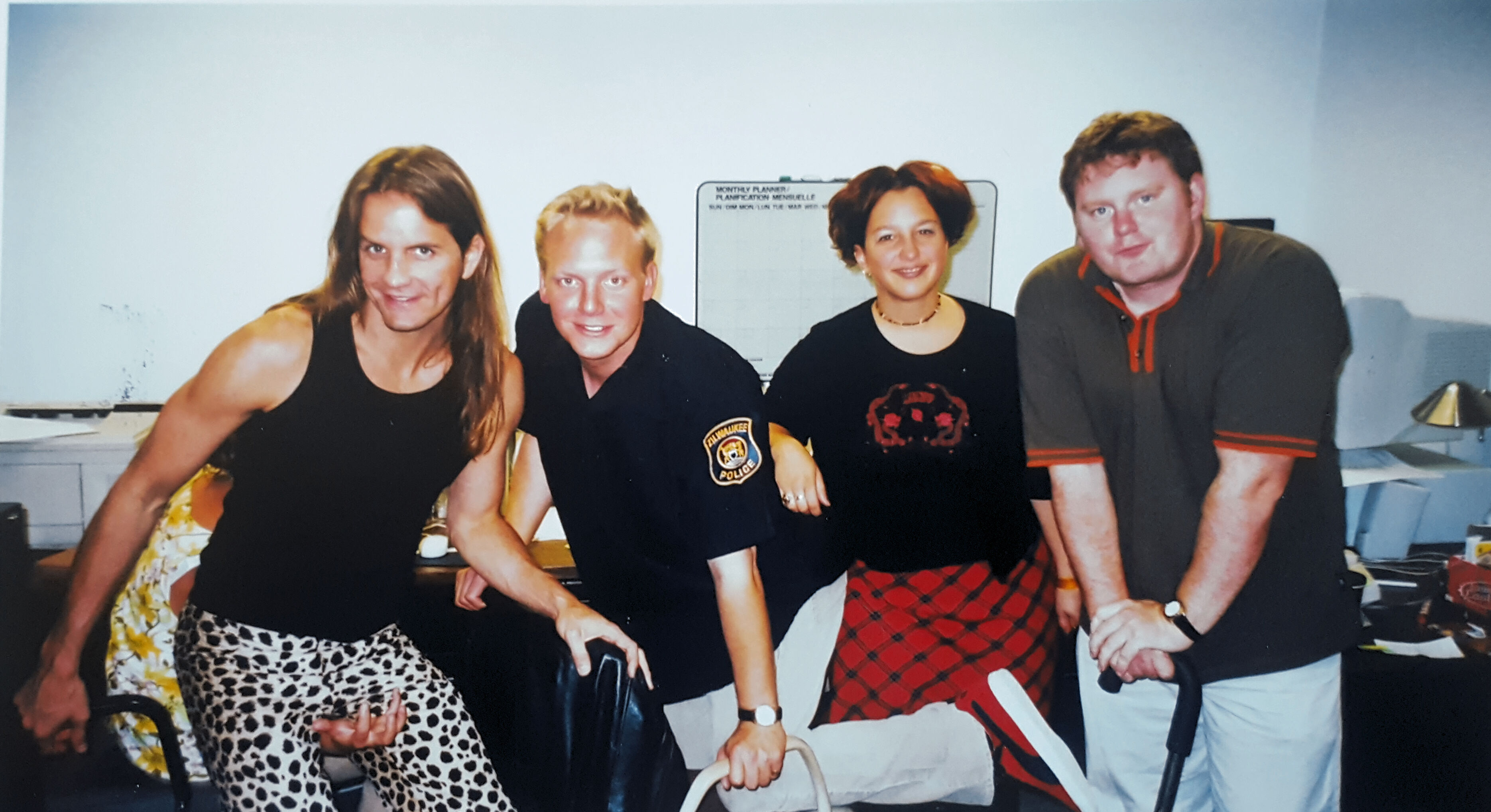
Pogue: I had written a sitcom in the late 80s. I came back to Toronto and I remember watching the show thinking, this is really funny. I thought Jonathan was better than Jim Carrey! I wanted to be where the funny people were and Jonovision’s audience was looking for smart television. They were doing sketches, too, which, historically in Canada, is kind of our thing.
Leiren-Young: Sketch comedy was huge still. It was the heyday of Kids in the Hall, and sketch was very much the thing at CBC, and so it made sense for us to be doing sketches.
Torrens: Some of the sketches worked, some didn’t. ‘Psychic Locator,’ remember that? It was so weird but suddenly people loved it. Gino Valente was a parody. Best Gino line ever: ‘Gino, you’re asinine,’ and Gino says, ‘Thanks! Yours is about a seven, seven and a half.’
Harvey: Paul knew a unit manager or something and somehow got my name. We weren’t looking for writers at the time yet, but I got this letter from him that was like, I know who you are, I know where you are, and I know what you need. I was like, ‘I have to meet this guy.’
Torrens: Paul came in and said, ‘Look, all the ingredients are here to bake the cake; you just need to double the butter.’ I didn’t even know what he meant but I was like, ‘Sign here, please.’ It was really a luxury to have freedom on the show. With lower budgets, I find you’re more creative with what you have. So, we put on wigs, we had access to CBC Archives, to CBC’s props and costumes departments and professionals; I mean, it was a pretty great playground.
Mortimer: The music stuff was the most fun stuff we got to do.
Harvey: Richard and Jono wrote all the musical stuff.
Mortimer: We had the considerable resources of the CBC broadcast centre, which was a very vital production machine at the time. There was a wardrobe guy who was a genius; we had stupid giant props. For music, we were able to either modify existing licensed bed tracks and arrangements or write totally original stuff. The studio cats we got to play on songs were poor musicians who woke up at 4 p.m. and watched Jonovision, so it was a thrill for them, too.
Torrens: We did an NSYNC video where I played all five guys; we had the country singer Ricky Paul Williams. We had Gig Saunders, the British rocker with the song, ’Rock and Roll is the Life I Choose,‘ which is actually a fucking banger. It really is; it’s a catchy song.
Pogue: There was a sense that anything could happen. All of a sudden, we’re doing ‘Dreg in the City‘ and I’m Queenie the Drag Queen and it was, just, Jonathan was so talented and would jump in and everyone would commit. But we learned to write back to the point of the episode. We’d have a serious segment and then a sketch that would be like, ‘But don’t take everything so seriously, either, because you’re 15.’ Truth was always the tone of the show.
Kim Bondi (Story Producer): This was before the internet, before social media. The information we could get about what was important to teenagers was limited. We would go into high schools and teachers would allow us to talk about what students were into, what they were curious about, what their career interests were, usually in the Grades 10 to 13 range.
Michelle Parise (Story Producer): We had these forms we’d get high school kids to fill out, with their phone numbers because nobody had email, and we would build shows around things written on those forms. Then we’d phone them and interview them, or we’d bring them on TV. It was laborious—not an easy process—calling kids on the phone. That was what we had to do.
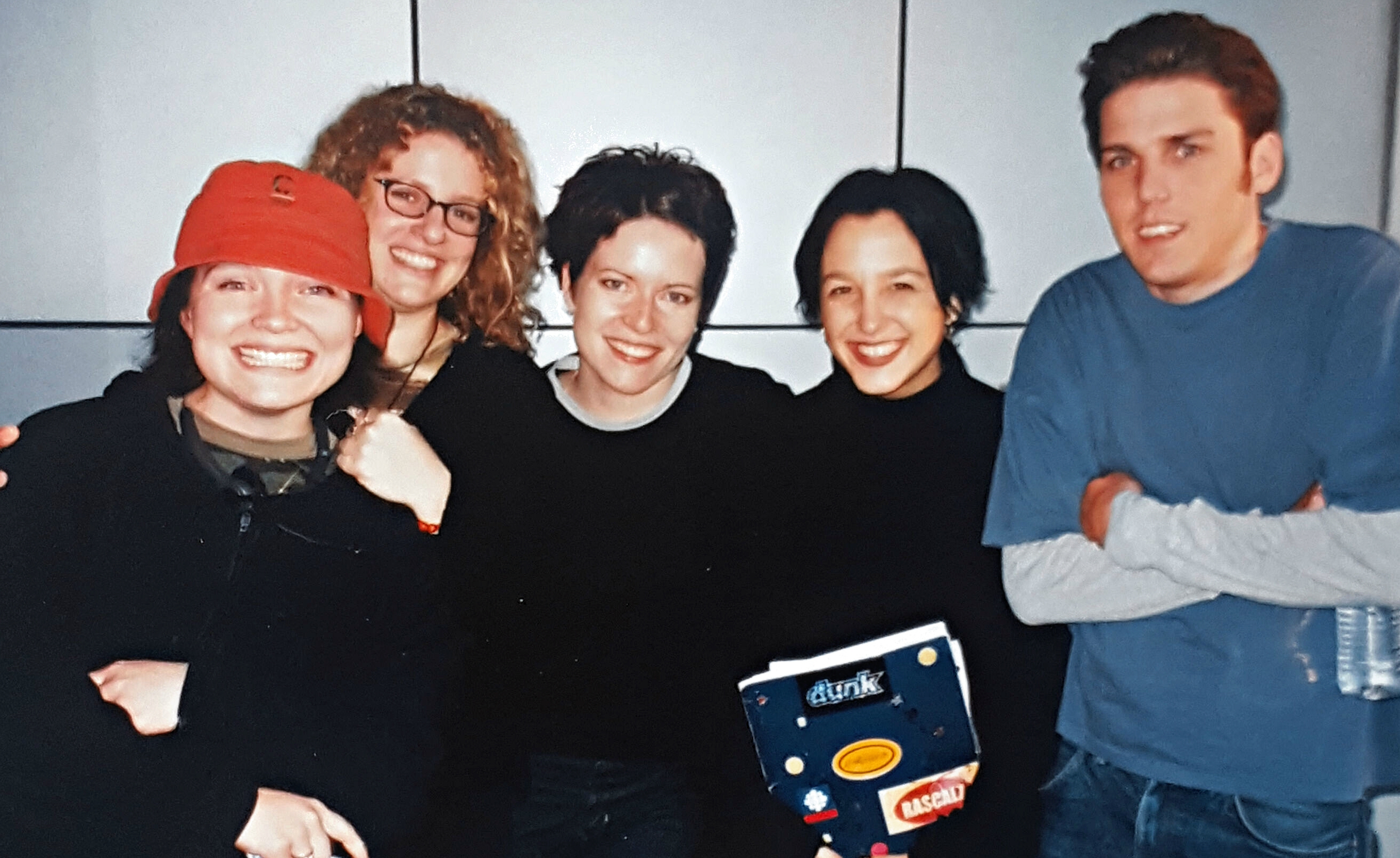
Bondi: We were given the brief that it was a teen talk show, and we were trying to get in the minds of the audience, and for that reason, most of the people we had on the show were that age. We’d have like, workshoppy episodes, how to get into different careers—modelling, film—and we were doing it all without trying to be coming from adults telling kids what to do.
Torrens: Issues that were also important to teenagers were like, ‘My best friend’s been getting me down’ or ‘My boyfriend has gas’ so we really covered a lot.
Stefan “Snake” Brogren (Guest): Jonovision had a way with finding what are the things we’re not exactly comfortable talking about. It was on the edge of talking about things that were relevant and uncomfortable for an adult to talk about. It was breaking boundaries at the time.
Torrens: With more serious episodes, like racism, we had enough time to open the can and let the worms out, but not really enough time to get them back in. We did an abortion episode and of course we’re not going to solve that in 22 minutes. But it was well-intended.
“Snake” Brogren: Degrassi and Jonovision were in the same zone as far as Canadian entertainment for young people. It was supposed to be scary, fun, supposed to make you think.
Michelle Parise: Jono was special because there wasn’t really anything else like it for such a specific demographic. This was all teenagers had as a reflection of themselves, except like Dawson’s Creek, which was a drama about American teens. It was the same with Street Cents. Kids on Jono were these goofy, weird-looking teenagers, not even good-looking teenagers.
Mark Bachinsky (Guest): I was in line in the parking lot to be in the audience and one of the producers came up to me and asked if I wanted to be on as an eligible bachelor for ‘Matchmaker 2000.’ I didn’t look like an eligible bachelor; I remember I had come from sports practice or something. But the audience went nuts; TV was the only thing we had back then.
Parise: There was a realism on Jonovision that predates reality TV. We won an award for the ‘Squeegee Nation’ episode, which was about squeegee kids. These were, like, homeless teenagers that I found on the street to talk about their experiences, because Jonathan’s very capable of range. Like, he could be really goofy and silly and ridiculous, and then he could interview homeless children, because they were children, in a kind and compassionate way.
Torrens: I enjoy the art of the interview; I’m nosey. I think it’s my P.E.I. heritage.
Leiren-Young: I think personalities shine through the TV and you could pick up that Jonathan is a genuinely nice guy, which is what you’re looking for as a teenager. Jonovision was a safe space for teens. In terms of creating teen television, you had a young guy who was talking directly to you, not down to you, who was engaging with teenagers, who was engaging with the guests, who was always positive. And we also had some phenomenal guests.
Torrens: It’s absurd Ryan Gosling was on the show, and at 15 he was already an intimidating actor. We had Sarah Polley and Jesse Brown from Canadaland. Mr. Dressup was on. The wrestling guys. Sex episodes with Sue Johanson. Ron MacLean was a special one.
Leiren-Young: Tom Green had agreed to do the show and we were working out ideas for a sketch, and he said, ‘I’ve got a dead raccoon in a Tupperware.’ We said, no, not for a teen show. But he kept pitching the dead raccoon. I was so sure he was going to sneak that dead racoon in the studio, so Lynn made security check his backpack before he was allowed in. Tom did our show and it was fine, but he was determined about that racoon. The next night or whenever, Tom’s on Mike Bullard’s show and he pulls out the dead raccoon.
Torrens: Mike Bullard barfed!
Leiren-Young: On live TV! I always felt that was our fault. I’m sorry, Mike.
Torrens: It’s only now that I’m able to look back with affection because neither (Street Cents or Jonovision) felt cool at the time. I always thought MuchMusic was cooler. Like, we were on the public broadcaster; it wasn’t sexy. But in hindsight, especially before the Internet, you realize what an impact it had. For people that grew up in the regions and didn’t have access to what was going on in Toronto, what kids were wearing, what they were listening to. Because I grew up in the (Atlantic) region, I was very aware of not being too Toronto-centric.
Leiren-Young: I used to joke that my gig at CBC was designated British Columbian. We tried to make it appeal to kids everywhere; what mattered in B.C. was different than Ontario.
Harvey: We sure tried to be regional; that’s why we took the show on the road, with the Halifax, Winnipeg, and B.C. episodes, even on our small budget. They were really great.
Torrens: Obviously five years times 40 episodes, some of the shows are going to be clams, and there were some clams for sure. But some, like the Jonopolooza episodes, where we gave a national stage to a teen band from, like, Burlington, that was pretty cool.
Parise: I was really involved in the music shows and produced all the Jonopoloozas. I feel very proud of that. At the time, hip-hop was not on Canadian television in any way at all. Even on MuchMusic, it was relegated to a specific hour or programming, like Master T’s whatever, but I booked every single hip-hop artist at the time. Michie Mee, Ghetto Concept.
Bondi: The best musical guests! Rascalz, Choclair, Maestro Fresh Wes, Kardinall Offishall.
Carlos Pineda (Kardinall Offishall Rep): Kardinall has no recollection of appearing on the show.
Torrens: I have a VHS tape in my basement that begs to differ.
Parise: Kardinall was on twice. I also worked closely with the bands. Tegan and Sara, Serial Joe, The Killjoys, Wide Mouth Mason, The Flashing Lights. Songs had to be two minutes and were lip-synced, so I’d do a paper edit down to two minutes, then send it back to the band to rehearse. I remember the Sum 41 guys because they were just the sweetest teenagers.
Deryck Whibley (Guest, Sum 41): Treble Charger was performing on the show, and they asked to have us on as well. We played ‘Sunday Morning Comics.’ The show really solidified that we wanted to do what we were doing, that it wasn’t just a high school after-school band kind of thing. We had a blast. We got to perform on something legitimate, and it felt like, ‘Now we’re going to be a real band, so we need to have a plan.’ It was after that moment for sure.
Torrens: It still wasn’t huge, though. The Tragically Hip wasn’t coming on. Sloan wasn’t coming on. I remember we asked Joshua Jackson from Dawson’s Creek and he was like, ‘That show is childish’ and I was like, ‘Yeah, it’s a kid’s show.’ So, it maybe didn’t have the respect as far as high-profile stuff, but the trade-off was that we got away with an awful lot.
(VICE reached out to Jackson's camp, but did not hear back. We will update this story if we do.)
Leiren-Young: What stands out more than other shows is the Degrassi episode.
Harvey: The Degrassi episode was huge. It was our highest-rated episode ever.
Parise: By that point, we were doing better numbers than MuchMusic. We were at 250,000 viewers and MuchMusic was at, like, 60,000 viewers at the same time, in our time-slot.
Pogue: We were doing prime-time numbers in the middle of the day, and I don’t think that was appreciated enough at the time; I don’t think our audience was valued enough at the time.
“Snake” Brogren: Leading up to it, I had done about four or five guest spots of Jonovision, and I think what happened was every time we did something like that—Pat Mastroianni (‘Joey Jeremiah’) did a guest episode, as well—they found they were getting a huge uptick in the numbers.
Bondi: Okay, so I had bought all these Degrassi Junior High paperback novels for like 50 cents and they were stacked on the back of my toilet. One day I thought, we should get these kids back together. So, we set forth on it. A lot of the cast hadn’t seen each other in years and a lot of these guys had dropped out of the business so it was a feat getting in contact with them.
Leiren-Young: It was like, Yes, let’s do it, see who you can get. But then I remember Kim going, ‘Everybody’s saying yes, how are we going to do this in 22 minutes?’ and I said, ‘Let’s split it into two parts.’ Lynn said, ‘We’ve never done a two-parter before,’ but part of my pitch for it was that I’d help promote it. So, I helped to do publicity and spread the word about it.
Bondi: We had fans flying in from San Francisco and all over North America to come to this reunion. We had full adults desperate to get seats. It became way bigger than we thought.
“Snake” Brogren: It was a reunion in a real sense. There had been a bit of a break, there wasn’t social media back then, so the cast hadn’t really seen each other. I think producers had been throwing around the idea of The Next Generation for a few years, but the Jonovision experience solidified it for people. I think it was an exciting moment for the producers. And the cast, too.
Leiren-Young: I interviewed Kevin Smith at a film festival, and he went on this riff about how much he loved Degrassi, so I told Kim to track him down to see if he’d be on the reunion.
Bondi: He sent a letter in about the show and how much it meant to youth television.
Leiren-Young: He ended up directing Degrassi later.
“Snake” Brogren: Because Jonathan had a strong relationship with Degrassi because of the Jonovision reunion, he was asked to play Shane McKay on TNG, which was a full circle moment.
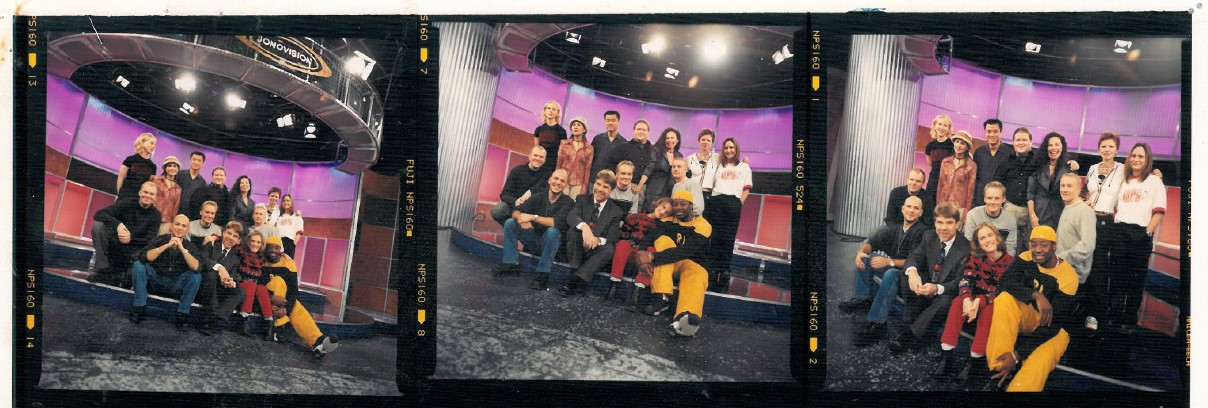
Bondi: When The Next Generation came out, we would all joke about how we were totally responsible for that, that we brought back Degrassi. I think Drake owes me a house in Malibu.
Pogue: That show should be sending us residual cheques.
Harvey: I’m still convinced that we’re one of the reasons Degrassi came back.
“Snake” Brogren: I guarantee the Jonovision special was a major catalyst to bringing it back.
Leiren-Young: I wasn’t aware of the popularity of the show until the Degrassi episode when suddenly there were big congratulations about the numbers. I knew a couple hundred kids showed up every week, and we were on before The Simpsons but no idea how popular.
Torrens: My feeling was that people watched us while waiting for The Simpsons. We got the overnight numbers, so we knew it was performing well, and I was aware that we had reached an audience that wasn’t otherwise watching CBC, which was cool. But I didn’t really have a sense of being cool, you know? I felt I was more on par with the Sesame Park puppets.
Leiren-Young: Jono was a rock star if you were a kid.
Bachinsky: He was the biggest star that I knew of in Canada. I was starstruck by him.
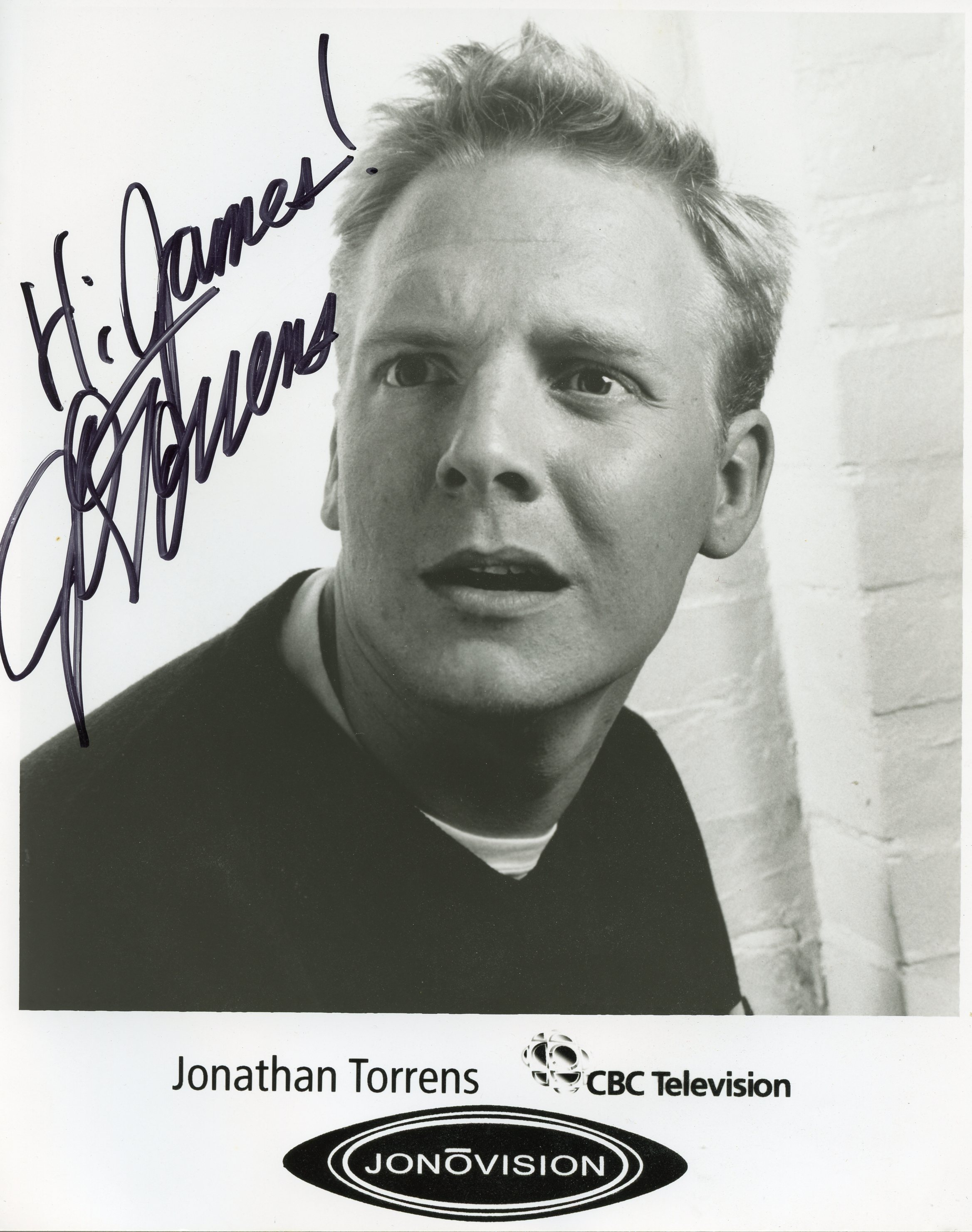
Jason Eisener (Audience): Jono was like a celebrity to us; he was just as famous as anyone from Hollywood. He was so charismatic and kids at the time were starving for entertainment. I remember at the taping we lost our minds. We kept yelling at Jono to come to Taco Bell with us after the show but there was no way he was going to Taco Bell with a bunch of high school kids.
Parise: I think teens saw themselves in Jono in an aspirational way.
Torrens: Television was different back then.
Mortimer: It was the power of being pre-Internet, pre-social media.
“Snake” Brogren: It’s not how we view entertainment anymore. If you wanted to be in touch with something, you had to watch it live, you know? It was the water cooler talk the next day.
Torrens: Watching TV was something we did by ourselves, but we did it by ourselves in great numbers at the same time. Like, if you didn’t watch Jonovision or The Simpsons or Seinfeld when it was broadcast live, you were out of the loop. So, you had to watch regularly.
“Snake” Brogren: It almost seemed like we were moving at a snail’s pace back then, one episode at a time, but Jonovision was absolutely on the cusp of what was happening, culturally.
Pogue: I think it influenced a lot of people in terms of talking the truth instead of B.S. What we were doing felt important but never self-important, and that sensibility was influential.
Mortimer: If you look at those audiences from seasons one to five, you do see the diversity and realness of it all. I know the kid’s department authorities at CBC were ecstatic because look at this lineup of kids with nose rings and green mohawks; we were relevant!
Harvey: At that time, I was thinking about my own rather rudderless teenage existence, and I kept thinking, teens need to connect, they need to have information, they need to not feel stupid. We needed to do those sex shows so they could ask questions no one was answering for them. The show was not only entertainment, because it was, of course, with Jonathan who was magical. But also, for kids to feel like they belonged, that there was a place to go, and like somebody was listening to them. I’m honoured if we had that impact on people.
Whibley: I think everything that happens in your life leads to where you are now and being on the show was important for us. Who knows what would have happened if we didn’t?
Parise: It’s really interesting to think about how the show launched so many careers.
Mortimer: I didn’t realize it was going to be my career highlight, happily and sadly.
Leiren-Young: Writing in the later years, there was a sense of, ‘How do we use the show to move Jonathan to his next thing?’ because it was a phenomenal showcase for his talent.
Torrens: I remember when Sum 41 was on because their moms were there and that’s when I realized, ‘I’m the same age as their moms now.’ I had been on CBC for 15 years by that point and my audience was aging with me. It was the same thing with J-Roc. Suddenly I was in my mid-40s in a durag and it just didn’t ring true. So, to end it on my own terms felt nice.
Parise: The last episode, I think it ended on a high note. The show went out strong.
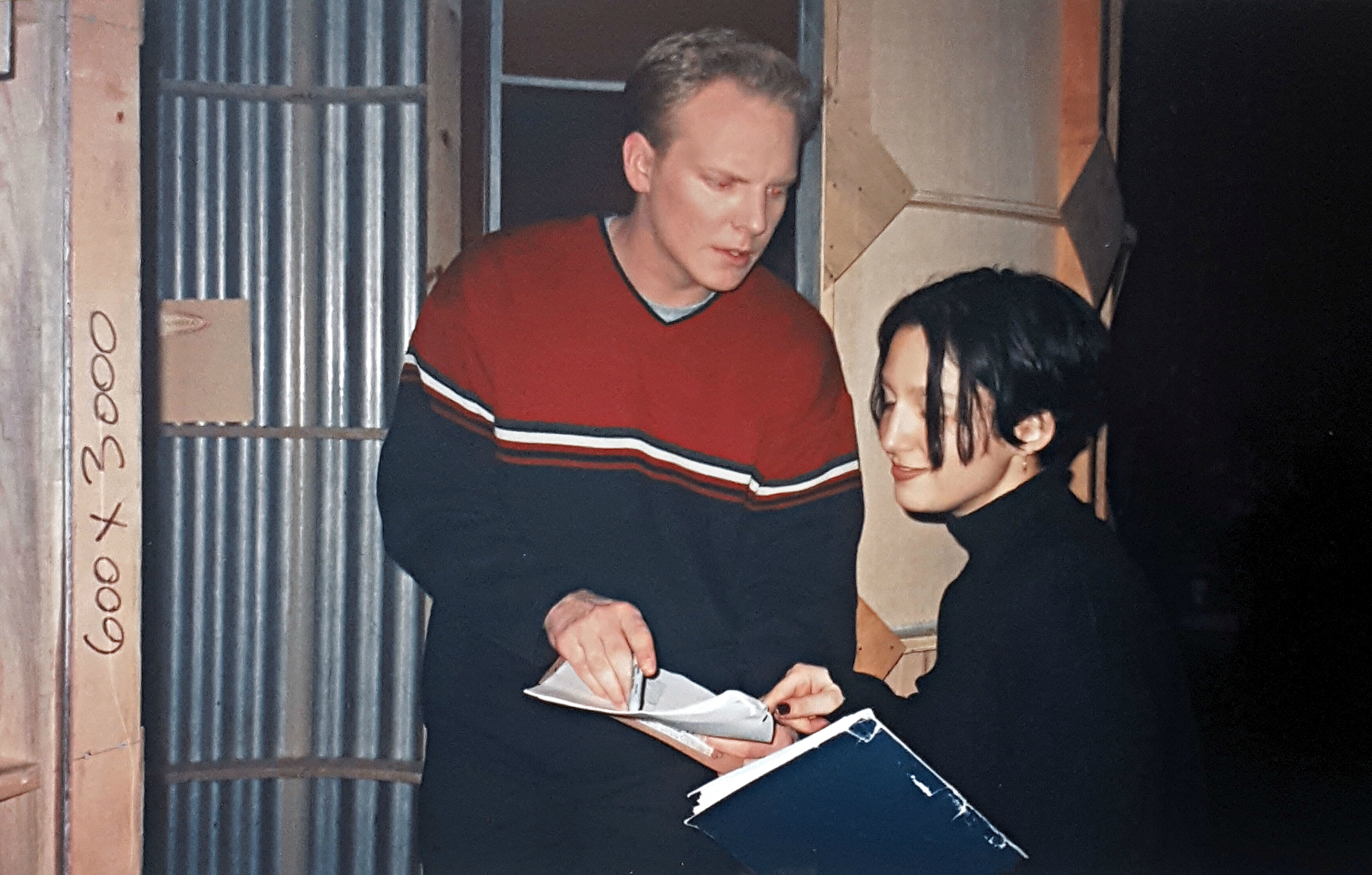
Torrens: In my career, I’ve always left when, you know, I’d rather have people say, ‘I wish you did more,’ instead of running it into the ground. I just think philosophically it’s better.
Leiren-Young: The last season, we were trying to gear it so that someone at CBC would realize Jono would be a great late-night host, like, this audience has grown up with him.
Harvey: He really wanted to do a late-night show and we continued to be in development for years doing sort of a Jonovision for grown-ups, but it’s convincing a broadcaster to do it. Not easy. But he’s so talented. Not many people are a great host and interviewer, a brilliant sketch performer, musician, everything. So, the show was really a rare time, and it was pretty cool.
Torrens: But is it just the nostalgia, or was it actually good?
Leiren-Young: I think we produced some pretty great television.
Mortimer: You know, on a road trip, you need the critical distance to distil it down to a delicious jujube in the confection of memory. You don’t remember being broken down on the side of the road for nine hours; you remember the ride. Jonovision was a good ride.
Follow Adria Young on Twitter.